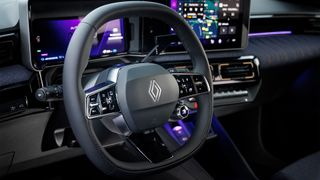Renault unveils a boxy reinterpretation of the classic R4, proving electric SUVs don’t have to be bland and faceless
Riding high on lithium-ion battery production, Renault continues its trip down memory lane with the unveiling of the Renault 4 E-Tech at the Paris Motor Show. This retro-inspired crossover is just as nostalgic as the recently released Renault 5, but with extra space and workhorse demeanor.
The original Renault 4 of the 1960s was immediately embraced in its home country, as it was used to transport everything from people to livestock in a rugged, reliable package. Just like the liberating Renault 5, millions of copies of the R4 were sold.
This newfangled all-electric version isn’t exactly true to the design language of its forebear, opting instead to offer a few subtle nods to the past. For example, there is a modern take on the original car’s vertical grille and the brutal rear side windows.
At the rear, there’s a clearer play on the original R4 in the shape of the taillights, while the designers have even added plastic shrouds to the rear bumper, reminiscent of the metal hooks found on 1960s cars.
Predictably, it’s based on the same AmpR small vehicle platform as the Renault 5, but it features higher ground clearance (about 1.2cm more than the Captur SUV) and overall improved interior space compared to the recent new version of the R5.
There is more head and legroom for the rear passengers and the boot or trunk space is up to 420 liters, which is an increase of almost 100 liters over the Renault 5.
The French brand has also added lashing hooks, elastic straps and recesses to store various items in the back… that’s where the practical side comes in.
One nice feature that has been resurrected from the archives is a modern take on the classic canvas roof. Here, a plastic canvas roof can be opened electrically – or with the help of the AI voice assistant Reno – to act as a sunroof, or peeled all the way back as a quasi-convertible.
Although, with the roof racks fitted as standard, opening the canvas roof to reveal the underside of a roof rack or top box is unlikely to be as romantic as looking up at beautiful Cote d’Azur sunshine.
Analysis: Renault is on a roll

With the recent launch of Renault 5, the unveiling of Renault 4 at the Paris Motor Show and the upcoming launch of an electrified Twingo (which will be the smallest and most affordable EV in the Renault stable), the French brand is going against the grain and offering style-focused, battery-electric vehicles that stand out from the crowd and are not exclusive to the wealthiest buyers.
Like Renault 5, the R4 E-Tech will be offered with battery packs of 52 kWh or 40 kWh, coupled to electric motors that develop between 120 and 150 hp. Depending on the size of the battery, the electric range will be 400 or 300 kilometers.
A similar infotainment offering is also on the cards, consisting of two 10-inch displays complete with AI assistant Reno and a premium Harman Kardon sound system. The interior is similarly stylish, relying on soft-touch fabrics and retro-inspired accents to create a premium atmosphere.
Prices haven’t been confirmed yet, but Renault says the 4 E-Tech will be slightly more expensive than the Renault 5, so we can expect prices to start around £30,000 – or around $40,000/AU$58,500.
With the Kia EV3, Skoda Elroq, Dacia Spring and Hyundai Inster all due to hit the market next year, Europe will be presented with a healthy choice of smaller, more affordable electric vehicles that could finally stem the tide of flagging sales numbers and hesitant buyers.
